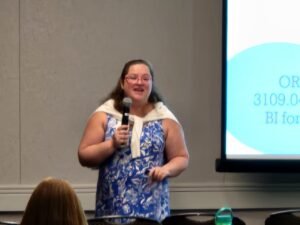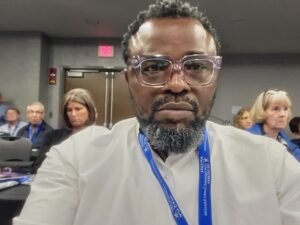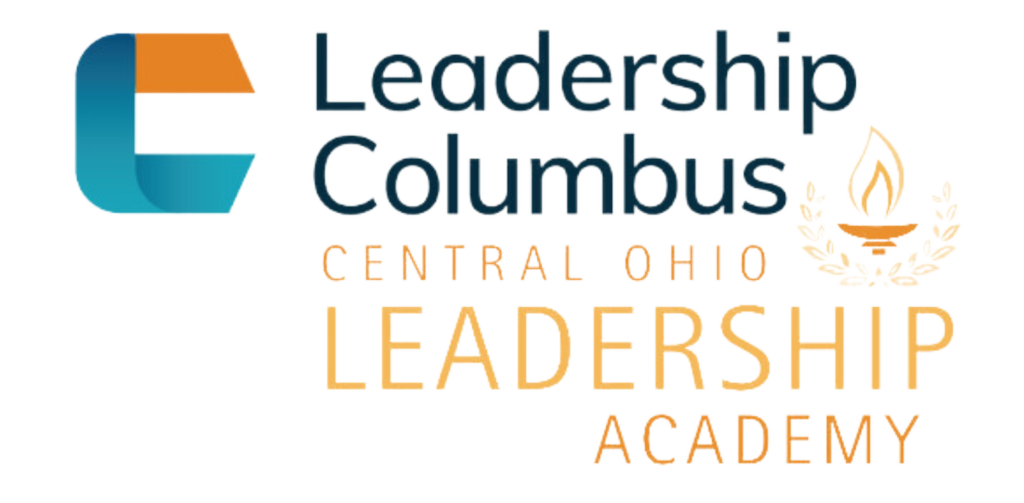Empowering Non-Attorney Advocates: Lessons from Day 3 of the 29th Annual Celebrate Kids Conference

By
Taiwo AKINLAMI
The 29th Annual Celebrate Kids Conference, organized by the Ohio CASA/GAL Association, continues to inspire and inform child advocacy professionals with vital insights. On Day 3 of the conference, held on September 27, 2024, Magistrate Brandin Marlow of Clark County Juvenile Court presented an impactful session titled “How to Advocate without Practicing Law: Guidance for Non-Attorney Advocates and Maintaining Confidentiality.” This represented on of the many workshop sessions taken on the last day of the conference.
This workshop focused on the importance of advocacy in child welfare cases and the delicate line non-attorney advocates must tread to avoid engaging in the unauthorized practice of law. With practical examples, case law, and real-life scenarios, Magistrate Marlow guided participants through the intricacies of effective advocacy, emphasizing the roles of CASA (Court Appointed Special Advocates) and GAL (Guardians ad Litem) in the juvenile justice system. The session also shed light on maintaining confidentiality and best practices to ensure credibility when advocating for a child’s best interests.

The Role of CASA and GAL Advocates
CASAs and GALs serve an essential role in juvenile court proceedings, acting as the court’s eyes and ears to represent the best interests of children in abuse, neglect, and dependency cases. These advocates conduct independent investigations, prepare reports, and provide recommendations that influence judicial decisions. Magistrate Marlow emphasized the crucial responsibility advocates bear in shaping outcomes that affect a child’s future.
However, the session highlighted a vital legal distinction: CASA and GAL advocates are not attorneys and must avoid engaging in activities that constitute the unauthorized practice of law. This point underscores the careful balance advocates must maintain between providing meaningful input and overstepping legal boundaries.
Unauthorized Practice of Law: What Advocates Cannot Do
Marlow began by explaining the concept of the unauthorized practice of law, which arises when non-attorneys engage in tasks reserved for licensed legal professionals. He gave clear examples from court rulings, including a 2014 case where an individual without legal credentials prepared and filed an affidavit, resulting in a $5,000 fine.
In one relevant case discussed during the session, a CASA advocate in courts was permitted to question witnesses during a trial—a practice later deemed an unauthorized act by the court of appeals. While the intentions behind the action were not malicious, it highlighted the legal boundaries that must be respected.
Marlow encouraged CASA and GAL volunteers to be cautious and always consult an attorney if there is any uncertainty about whether their actions may cross into legal practice. The Magistrate stressed that non-attorney advocates should refrain from drafting legal documents, questioning witnesses, or making legal arguments in court. Instead, their focus should remain on investigating and advocating for the child’s best interest through appropriate channels.
Effective Advocacy: Best Practices for CASA and GAL Volunteers
While CASA and GAL volunteers are prohibited from practicing law, they can and should play an active and effective role in the child welfare system. Magistrate Marlow stressed the importance of thorough investigations and well-prepared reports as the most powerful tools in an advocate’s arsenal. Reports should be clear, fact-based, and backed by objective evidence, as they are critical in informing judicial decisions.
Marlow shared an anecdote from his own experience where a CASA report became a pivotal document in a case. In this instance, the detailed nature of the report led to a case being settled before going to trial, saving both time and emotional strain on the parties involved. He emphasized that a well-documented report not only aids the court but can also help attorneys settle cases, reducing litigation and further trauma to the child.
Writing Effective Reports: Know Your Audience
One of the key lessons from the workshop was understanding the audience for a CASA or GAL report. Magistrate Marlow explained that while the primary audience for these reports is the judicial officer, other stakeholders, including attorneys, parents, and children services agencies, will also review them.
It is crucial, Marlow said, to tailor the report to its audience, ensuring that all critical details are included and presented in a manner that clearly outlines the child’s needs and best interests. For example, if a case involves a motion for permanent custody, the advocate’s report must include specific details about the child’s interactions with parents, foster caregivers, and siblings, as well as the child’s wishes if they are old enough to express them.
Confidentiality: A Cornerstone of Ethical Advocacy
Maintaining confidentiality was another core theme of the workshop. The Magistrate emphasized that CASA and GAL advocates must respect the privacy of all parties involved in the case. This means not sharing sensitive information with unauthorized individuals, and being mindful of how they handle documents, case notes, and reports.
One significant point raised during the session was the importance of not engaging in biased behavior, particularly when dealing with parents, foster parents, or other caregivers. Advocates must avoid showing favoritism or providing information to one party without offering the same to the others. Marlow cautioned against behaviors that could give the appearance of bias, as this can undermine an advocate’s credibility and compromise their ability to advocate effectively for the child.
Practical Examples and Case Studies
Throughout the session, Magistrate Marlow provided practical examples and case studies to illustrate the key points of her presentation. She shared the story of a case in which an advocate, acting with the best of intentions, had given advice to a foster parent that inadvertently crossed the line into legal territory. While the advocate believed they were helping, their actions created legal complications that could have been avoided by consulting an attorney.
In another case, an advocate’s thorough investigation and detailed report led to the discovery of critical information that had been overlooked by other parties in the case. The advocate’s report highlighted concerns about the child’s emotional well-being, which ultimately influenced the court’s decision to place the child with a different caregiver.

Handling Conflict and Bias in Advocacy
One of the most challenging aspects of advocacy is navigating conflict, particularly in cases where family members or caregivers are at odds. Marlow discussed how CASA and GAL volunteers must remain neutral and focused on the facts, even in emotionally charged situations. He shared a personal story of a case involving a divided family, where one set of grandparents wanted custody while the other opposed it. By staying neutral, conducting thorough investigations, and focusing solely on the child’s best interest, the advocate was able to provide a clear, unbiased report that helped the court reach a fair decision.
Marlow also addressed the issue of bias, cautioning advocates to avoid allowing personal judgments to influence their recommendations. She emphasized the importance of documenting all interactions and observations and ensuring that reports are based on objective evidence rather than subjective opinions. Bias, she warned, can erode an advocate’s credibility and undermine their effectiveness in court.
Moving Forward: Tools for Success
To help CASA and GAL advocates succeed in their roles, Magistrate Marlow provided practical tools and resources, including a checklist for preparing reports and a guide to understanding the different legal terms and motions used in child welfare cases. He encouraged advocates to familiarize themselves with the legal definitions of terms like “temporary custody,” “legal custody,” and “permanent custody,” as each has specific requirements and implications for the child’s future.
Marlow concluded the workshop by reiterating the importance of collaboration between CASA volunteers, GALs, attorneys, and the courts. He encouraged advocates to ask questions, seek guidance from legal professionals when necessary, and always prioritize the child’s best interests.
Conclusion: Advocacy with Integrity and Compassion
Day 3 of the Celebrate Kids Conference provided CASA and GAL volunteers with invaluable insights into the complexities of child welfare advocacy. Magistrate Brandin Marlow’s session on advocacy without practicing law highlighted the critical role these volunteers play in ensuring the well-being of vulnerable children, while also underscoring the importance of maintaining professional boundaries and confidentiality.
The workshop equipped advocates with the knowledge and tools needed to navigate the legal system effectively, reminding them that while they are not attorneys, their voices and reports are essential in shaping the future of the children they serve. By adhering to ethical guidelines, conducting thorough investigations, and writing clear, fact-based reports, CASA and GAL volunteers can continue to make a profound difference in the lives of children across Ohio and beyond.
As the conference continues, participants leave the session empowered with a deeper understanding of their roles and a renewed commitment to advocating for children’s best interests with integrity, compassion, and professionalism.

Taiwo AKINLAMI is the Curator-in-Chief of the S.A.F.E for Children® Information Bank, Ohio, a project of Power Parenting Company LLC (http://www.powerparentingcompany.com/)





